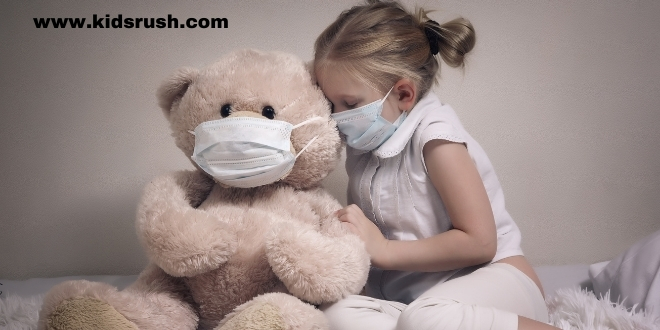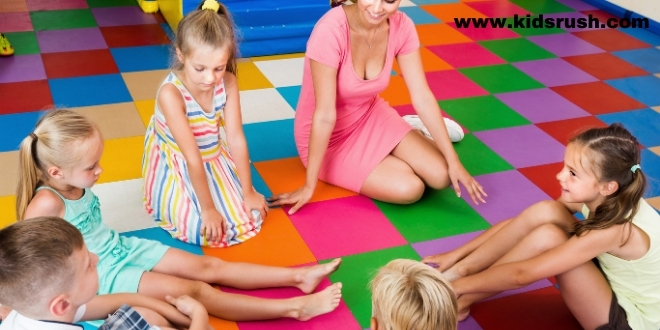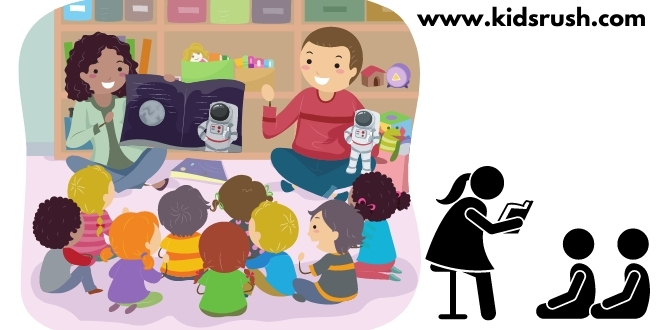Children need to develop their sociability. Social interaction can be useful for personal relationships as well as for professional careers. There are many ways to help your children develop social skills. Start by explaining to them the basics of politeness and kindness. From there, find activities that help develop social interaction, such as group activities and team sports. If you feel that your child is having a hard time socializing, you may need to call a professional. In this article on kidsrush.com, we will explain to you ways to improve the sociability of children. Let’s start!
Explain the basics to improve the sociability of children
Explain the concept of personal space
Personal space is one of the bases of social interaction. Young children may not understand that each person has a personal space that must be respected [1].
- Explain to your children that personal space depends on each person and culture. People with close children, such as siblings or family members, maybe more open to hugs and physical contact than strangers. People may also need more or less personal space depending on their culture [2].
- Teach your children how to interpret body language. Explain that if a person is tense, folds their arms, and/or steps back, it means invading their personal space.
- Also, explain to your children that they each have the right to their own space. Don’t wear them without their permission and don’t hug them if they don’t feel like it. Make them understand that they have a right of authority over their own body.
- Teach children to do the same in return. Tell them to ask permission before hugging someone, sitting on people’s lap, etc.
Read Also: Exercises to improve attention in children
Teach them empathy

This is another important basis in social interactions. Young children have a limited perspective. They may find it hard to put themselves in other people’s shoes. Strive to help your children understand how empathy works [3].
- Encourage them to use their imaginations. Tell them to imagine themselves in various situations. Look for opportunities to teach them something daily. For example, if your child tells you that they saw someone being bullied at school, encourage them to imagine how they would feel in this kind of situation.
- When you watch TV or a movie, ask your children what they think a character feels and why. Encourage them to imagine themselves in a similar situation and to think about how they would feel.
Teach children how to have a conversation

Knowing how to hold a basic conversation is essential to develop socially. Often, young children are not sure how to participate in a conversation and may cut others off or not listen to what they are told. Teach your children the basics of following a conversation well [4].
- Explain to them how to start a conversation. Teach them the classic ways to greet someone. Tell them to approach others by saying “hello”, “how are you?” “, Etc. Also talk to them about non-verbal ways of greeting each other, such as waving a hand, smiling, nodding, or kissing.
- Explain to your children that they must take their turn to speak in a conversation. Tell them that it is important to wait until someone has finished speaking before intervening. Also, teach them how to listen. Explain that in a conversation, you have to respond to what the other person is saying rather than just talking about yourself.
- Also, teach them to be assertive when talking to people. Explain that assertiveness is different from being aggressive. It’s just about asking what you want straightforwardly and honestly. People who communicate in this way do not use threats, insults, or excuses to get what they want [5].
Read Also: How to teach road safety to children
Teach basic politeness
Young children often do not know the rules of politeness so it is important to teach them. Explain to the children that it is essential to say “please,” “thank you,” “excuse me” and to use other basic polite phrases. Make a rule at home that you always say “please” and “thank you”. Your children will thus learn to have good manners.
Address the expression of needs and desires
Children can often be unwittingly sassed when expressing their wants and needs. For example, your daughter may tell her older brother that he’s mean if he doesn’t let her participate in a game. In reality, she is trying to say that she doesn’t like to feel left out. Teach your children the correct way to tell others what they need or want [6].
- Correct your children at the time of the fault. If you hear your son telling your daughter that she’s mean because she doesn’t share a toy, jump in by saying something like, “What you mean is you want your sister to leave you too.” to play. Tell her that you want to feel included, too. “
- Teach your children to be direct when they are unhappy with another person’s behavior. A very young child can punch and kick if they feel like they are being made fun of. Teach him to use words. When your child is laughed at, teach them to say something like, “I don’t like you talking like that and I need you to stop.” “
- Teach your children to take time to think when they are upset. If a child is unsure of what they want or need, ask them questions to help them find the answer. Ask something like, “Why are you angry?” Or “Why are you reacting this way? “
Read Also: How to prepare your child to stop playing video games
Find activities that develop sociability
Read stories to your children

Reading fiction has been shown to help develop empathy in children and adults alike. Choose children’s stories of good literary quality over popular works of fiction, as the characters in the latter are usually less developed. Children’s classics like The Little Prince or Charlotte’s Web can help children develop empathy, which can help children to improve their sociability throughout their lives [7].
Read Also: Parents’ mistakes that cause low self-esteem in children
Behave in an exemplary manner
A good way to help your children behave well in social interactions is to simply behave well yourself. Respect others every day. If you take your kids when shopping, speak politely to the cashier. When picking up your child from school, be polite and kind to other parents, teachers, and school staff. Children admire their parents and yours will reproduce your good habits by watching you [8].
Play “emotional charades”
It is an excellent game for teaching children how to interpret nonverbal social signs. To play, write down various emotions (happy, scared, etc.) on pieces of paper. In turn, each person must draw a piece of paper and act out the emotion written on it. It can help children recognize what a person feels like when they feel a particular emotion [9].
- You can also play a variation similar to Pictionary. Tell your children to draw people or animals feeling a certain emotion and try to guess which one it is.
Read Also: Nelson Mandela quotes that educate children in peace
Play games that promote eye contact

Eye contact is another important element in social interactions. In Western culture, looking at a person in the eye shows that you are listening to them and paying attention to what they say. Play games that teach your children how to maintain eye contact [10].
- To teach your kids how to maintain eye contact entertainingly, you can have a contest to see who can look each other in the eye the longest.
- You can play “eyes on the forehead”. Stick a sticker with two eyes on your forehead and tell your children to look at the sticker. It’s not real eye contact, but kids will get a sense of which direction to look when talking to someone.
- When your child is on the swing, encourage him to look you in the eye.
- Be sure to explain to your child that eye contact is not of equal value in all cultures and that in some cultures it is even considered that looking someone in the eye is rude [11].
Read Also: 3 guidelines to create a good study habit in children
Support the social life of children
Support the friendships

Friendships are necessary for the social growth of children. To help yours develop their sociability, encourage their friendships so that they develop and are strengthened [12].
- Invite your children’s friends to play at your place. Talk to parents and offer to host their children for a day.
- Take your kids to events where they will see their friends. School events, birthday parties, and going out to places like parks can be great ways for your children to see their friends regularly.
- Help your child overcome conflicts with his friends. Explain that it is normal for friends to argue or be angry with each other. If he hurt a friend, encourage him to apologize.
Read Also: Sexual Abuse: How to know if your child is a victim of this?
Get your kids involved in team sports
Research has shown that team sports can develop important social qualities such as empathy or leadership skills. If your kids enjoy sports, consider signing them up for a team.
- In addition to the beneficial effect on sociability, sport allows for physical activity and promotes healthy habits. People who play sports as children are less likely to smoke and may have better self-esteem.
- However, remember that not all children enjoy sports. If your child doesn’t want to do it, don’t force it. There are many other extracurricular activities to promote group work and team spirit. They can be just as beneficial for your child as team sports.
Involve your child in extracurricular activities
These activities can be great for encouraging children to develop their social skills. Encourage your children to join school clubs or participate in activities organized by the municipality.
- Respect your child’s interests. If he likes writing and art, find him plastic art lessons or suggest that he write articles for the school newsletter.
- Don’t forget about organizations like Boy Scouts. Many children learn important skills from these organisms.
Read Also: Table to apply discipline to children according to their age
Seek external help to improve the sociability of children
Call a therapist
If you have the impression that your child is not developing socially, he may have an underlying mental disorder. If you are concerned about your child’s social development, see a child psychiatrist. You can ask the doctor to treat your child to refer you to someone or find a child psychiatrist through your insurer.
Know how to recognize the problems of social development in children
If your child is not developing their social skills, it may be a sign that they are different from others. Various disorders, such as a genetic disability or autism, can slow down or disrupt the social development of children. If your child seems to be having difficulty in the following areas, see a pediatrician or child psychiatrist.
- Your child may not interact with others between the ages of nineteen and twenty-four months. He may not smile or react when he looks at you. It is also possible that it does not play and recognize images of familiar objects. These symptoms may indicate that your child has autism.
- If a child has autism, as they grow older their social development may continue to be slowed or disrupted. He may not participate in brief conversations, learn to follow simple directions, listen to stories, make friends, initiate conversations, and express physical states. This means he doesn’t say things like “I’m hungry” or “I’m in pain”.
Read Also: Guide for parents to teach your child not to hit others
——————————————————————————————————————–
References
- http://www.parents.com/kids/development/social/improving-kids-social-skills/
- https://www.mindtools.com/pages/article/cross-cultural-mistakes.htm
- http://www.parents.com/kids/development/social/improving-kids-social-skills/
- http://www.cdl.org/articles/social-skills-and-school/
- http://www.srcp.org/for_some_parents/developmental_disabilities/activities_to_use_with_your_child/assertiveDD.html
- http://www.ahaparenting.com/parenting-tools/socially-intelligent
- http://www.scientificamerican.com/article/novel-finding-reading-literary-fiction-improves-empathy/
- http://www.ahaparenting.com/parenting-tools/socially-intelligent
- http://www.friendshipcircle.org/blog/2011/03/28/12-activities-to-help-your-child-with-social-skills/
- http://www.friendshipcircle.org/blog/2011/03/28/12-activities-to-help-your-child-with-social-skills/
- http://healthvermont.gov/family/toolkit/tools%5CF-6%20Cultural%20Differences%20in%20Nonverbal%20Communic.pdf
- http://www.ahaparenting.com/parenting-tools/socially-intelligent
